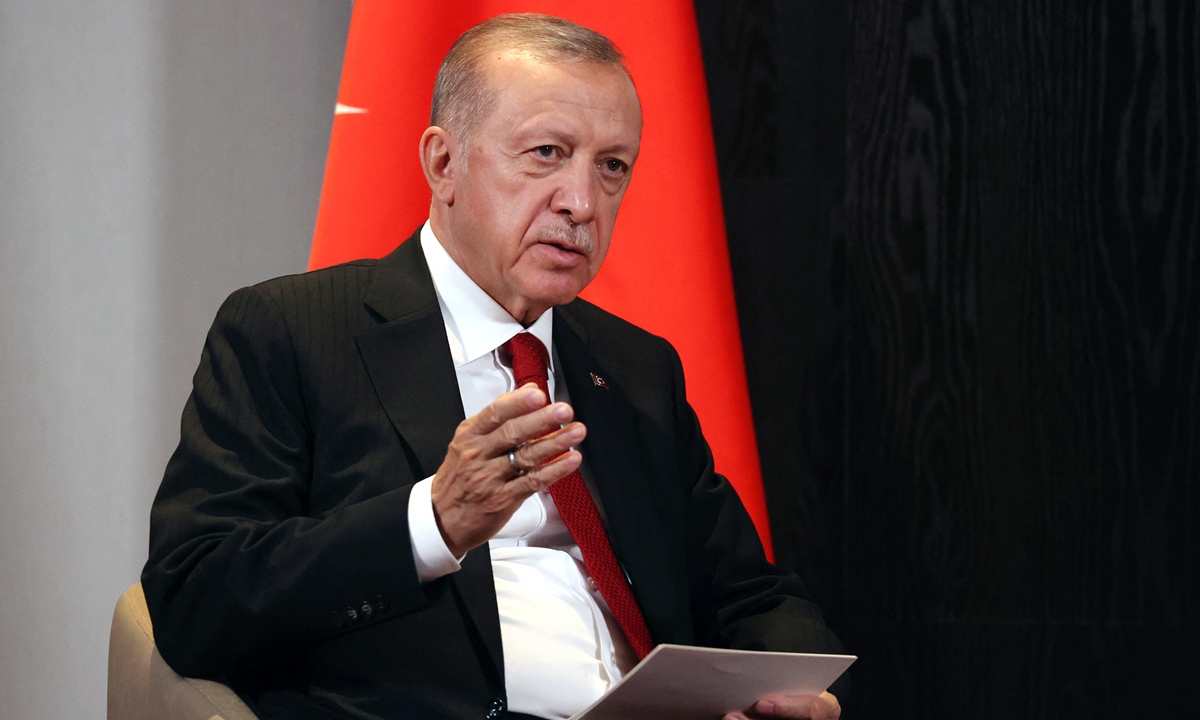
Turkish President Recep Tayyip Erdogan attends a meeting with Russian President on the sidelines of the Shanghai Cooperation Organisation (SCO) leaders' summit in Samarkand on September 16, 2022. Photo: AFP
Recep Tayyip Erdogan has been reelected president of Turkey. Through the US and European media, the real attitude of the Western world, which is bitter but resigned, has been fully expressed. These media outlets, so grief-stricken after the election results came out, continued to label Erdogan as a "nationalist," "underminer of democracy," and a "modern sultan."The Turkish government under Erdogan is characterized by its "daring to offend anyone," including a once radical stance on Xinjiang-related issues. But today, Turkey's relations with China are generally good. Erdogan administration's most striking political move has been the most prominent friction and conflict in relations with the US and the West in the post-Cold War era.
Turkey is an important member of NATO but a "strange bedfellow" of the West. And its relations with its historical enemy Russia have been surprisingly close. Several points of conflict between Erdogan and the West include the purchase of S-400 missile defense systems from Russia in 2017, for which Turkey was sanctioned by the US. Ankara's position on the Ukraine crisis is also at odds with the West, as Turkey does not participate in sanctions against Russia. Instead, Turkey's purchases of Russian energy are increasing significantly.
In addition, Erdogan has his own position on Syria and has a tendency to make peace with the Bashar al-Assad regime, which is not accepted by the West. Also, his persistence in preventing Sweden from joining NATO because of the Kurdish issue has surprised the West. Another profound reason is that Erdogan suppressed a coup d'état attempt by pro-US military and political elites in 2016 and strengthened the country's national security measures. As a result, he has long been labeled "anti-democracy" in the Western media.
This year marks the 100th anniversary of Mustafa Kemal's revolutionary triumph and the establishment of modern Turkey. Turkey is at the heart of Eurasia. It is one of NATO's most important allies, and a barrier between Europe and the Islamic world in the Middle East. It has more troops than any country in Europe. It is also a "modernization model" set up by the West for the Muslim world, a springboard for punishing "troublemakers" in the Middle East, and a buffer zone to keep Middle Eastern refugees out of Europe. With Turkey guarding the straits between the Black Sea and the Mediterranean, Russian warships can't just pass through at will.
But how has Erdogan become the longest-serving leader of modern Turkey? He has "ruled" Turkey for 20 years and now has another five years. The West hoped that the pro-West opposition leader, Kemal Kilicdaroglu, could win the election. Erdogan received 52 percent of the vote while Kilicdaroglu got 48 percent. The figures are very close. Why cannot Erdogan be brought down?
Although Turkey is a Muslim country, its secular politics has evolved for a hundred years and has quite strong foundation. The US and the West, who dislike Erdogan so much, should be able to influence Turkish elections. However, Erdogan won again this time, although he publicly said after his victory, "the only winner is Turkey."
I believe that the West's inability to bring down Erdogan reflects the slow decline of the Western overall influence, and the abrupt and serious loosening of its grip over Turkey, which is at crossroads of different civilizations. Turkey's economy is getting worse, with inflation reaching a peak of 85 percent last October, the highest in nearly 25 years. Turkey couldn't get the economic support it expects from the West, and its actual interests tied to the West are becoming increasingly thin. Turkey has been applying to join the EU since 1987, but for political reasons it has not yet joined. Turkey has become a "frontier guard" for the West, working hard but not being rewarded. It's no wonder it has grievances.
Erdogan won the election, but not by an overwhelming margin. His votes were not much higher than those of the opposition leader, reflecting the confusion and hesitation of Turkish society. Many people are dissatisfied with the West, and Turkish nationalism is experiencing a new awakening, but in reality Turkey is in a dilemma. Erdogan is facing the daunting challenge of restructuring the economy, especially the task of curbing hyperinflation. His government and country will move forward on a very bumpy road.
Some people believe that if Turkey becomes more chaotic and suffers more hardships, it may return to the "warm embrace of the West." However, there is something wrong with this judgment. Many experiences in the world have shown that chaos is the breeding ground for nationalism and strongmen. If Turkey's economy continues to deteriorate, it will be really hard to say which one, nationalism or the so-called "democracy" of the West, will become more appealing. The West had a great influence in the past, not only because of their gunboats, but also because of the idea and illusion they exported that following the West would lead to prosperity and wealth. This illusion is now flickering like a kerosene lamp in the wind in Turkey, and the oil in the lamp is running out. Even in Germany, 60 percent of Turkish people support Erdogan, which is higher than the proportion of support he receives in Turkey. Erdogan will continue to give a headache to the US and the West for the next five years.
The author is a commentator with the Global Times. opinion@globaltimes.com.cn

